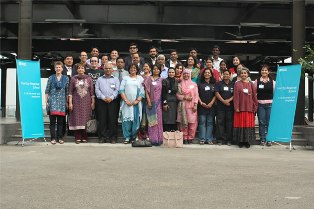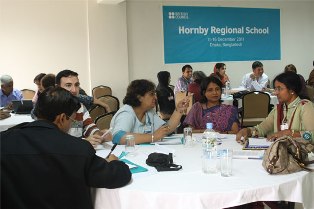|
Members of seven South Asian English Language Teachers
Associations came together for a six-day intensive seminar-workshop
(11-16th December 2011) in Dhaka, Bangladesh,
sponsored by the Hornby Trust and run by the British Council. Organized
as a retreat in an idyllic centre in a lush green suburban area, it
brought together 30 participants from Bangladesh (BELTA), India (ELTAI),
Pakistan (SPELT), Sri Lanka (SLELTA) , Nepal (NELTA), Afghanistan
(ELTA-A) and Iran (AzerELTA). Each TA was represented through a mix of
experienced and newer members.

The objective of this seminar was to enable TA participants to
share best practices and learn specific skills related to running and
extending their associations effectively. In addition, it explored ways
of creating stronger links between TAs in the region.
As such, the seminar offered opportunities for TA participants to:
- share success stories and best practice in key areas
- review TAs’ current strategic plans and develop ways of improving them
- develop core financial management skills
- develop skills related to marketing, fund-raising & sponsorship
- raise the confidence levels of less experienced members in their volunteer roles
- raise awareness and greater acceptance of ways of promoting
more transparent succession planning such as recruitment, role
shadowing, mentoring.
George Pickering, ELT consultant and leadership and management
trainer, with his unique training style spiced with humour, provided the
major. Several interactive workshops had the participants discussing
key issues around topics in groups before sharing their ideas in plenary
sessions. They moved around to different groups in order to allow them
to work with as many different people as possible. The course was also
designed to ensure that more participant centred-activities took place
in the afternoons, and towards the end of the week. The TA
representatives made mini-presentations on certain topics, gave joint
presentations about their own TAs and, on the final day, delivered short
presentations on the post-workshop projects which they had designed and
would be carrying out. For a glimpse of the activities at the Hornby
School, look
here.

During the seminar, a sub-committee, made up of a member from
each TA was formed to look into future regional co-operation between the
TAs. The committee came up with a number of proposals:
- TAs in the South Asia region
might sign Memorandums of Understanding between each other. These would
include exchange of newsletters, journals, sharing of information
regarding visiting speaker itineraries and annual conferences and a
waiving of conference registration fees.
- Participation in Peer Support Reviews, in which TAs would
self-assess themselves and then be peer reviewed by TA members from
other TAs at their annual conference.
- Mentoring of less-experienced TA leaders by experienced leaders from other TAs.
- Exploring opportunities for future collaboration by setting up
a VLE (Virtual Learning Environment) or a Discussion Forum (e.g. Yahoo
group).
- In the longer term, organizing a regional conference and carrying out joint research.
The feedback from the TA participants showed a great
sense of satisfaction and appreciation not only for the day-time
sessions but also for the fun-filled social activities in the evening. A
workshop DVD video was made by a film crew which vividly captured the
flavour of the event.
The longer term success of this seminar-workshop will of course
depend on the performance of the post-workshop TA communities. The
extent of this will obviously depend on which TA representatives will
carry forward their strategic planning and post-workshop projects.
Moreover, it will be interesting to see how many of the relatively
inexperienced TA volunteers on the course will assume TA committee
positions in the future.
With regard to BELTA, there have been three follow-up workshops
since February to address some of the issues the TA had identified as
its major challenges. One workshop was on ‘Personal Effectiveness’ and
the other on ‘Leadership in Education’. BELTA had also identified the
challenge of keeping its regional Chapters alive and interested. As such
the British Council ELT Advisor in Dhaka has supported a Chapter
Handbook Working Group. Over the last four months, the group has worked
to finalize a Chapter Handbook that will provide realistic and easy
guidelines for new Chapters to be mentored and to develop into effective
TA entities. For more information on BELTA.
Finally, the most significant post-seminar outcome appears to
be the proposed Peer Support Review (PSR) that is being initiated in Sri
Lanka during SLELTA’s International Conference in September 2012. Again
supported by the British Council, two representatives from the seven
TAs will be attending - first to undertake a training session on PSR and
then do the actual review, finally giving a feedback session to the
host TA, SLELTA. Simultaneously, the visiting TA delegates will also
represent their country on a TA panel session and conduct a workshop at
the SLELTA conference. This PSR exercise will certainly prove to be an
invaluable learning experience for all the TAs.
www.belta-bd.org
Arifa Rahman is a teacher educator in Bangladesh. With long experience in ELT and research, Arifa is actively involved in empowering English teachers through her TA, BELTA.
|

